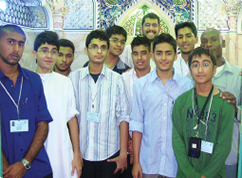The Significance of the Day of Arafah
In the name of Allah the most Gracious and the most Merciful.
The Day of Arafah is one of the most blessed days. In traditions, we can see
that it is narrated, “People who weren’t able to achieve their purpose and
goal in Laylatul Qadr or those who weren’t forgiven on that day, Arafah is
the last opportunity for them”. This day in its blessedness, sacredness and
holiness weighs the same as the Night of Qadr. In days there is no bigger
day than Arafah and in Nights there is no bigger night than Laylatul Qadr!”
Prophets have been specially blessed on this day. Prophet Musa received many
blessings on this day, like wise Hazrat Adam achieved his purpose on this
day too.
There are a few Amaals(Recommended rituals) for this day and the first of
which is to be present on the Plains of Arafah. Pilgrims have to gather in a
desert over there from zohr to maghrib and have to spend the same night at
Muzdalifah (Mash’ar) after which the pilgrims go the Valley of Mina.
Someone asked Imam Ali (a.s) “Why does Hajj have such kind of a sequence?”
what he meant to say was after becoming a Muhrim (after wearing the ihram)
one needs to go out of Mecca, out of the Haram and then come back later
after a performing a few obligations. In response to this question, Imam
(a.s.) told him that a person who comes from his polluted routine life into
such a holy place, he is not prepared for it and for this reason he is sent
to such plains and valleys so that he can be trained and made capable of
going to the Ka’aba. One’s condition is recognized when one visits the House
of Allah (s.w.t), and the style of circumambulating shows how engrossed the
person was in his daily routine earlier. And so for this reason he is sent
to Arafah where he spends half a day, and then a whole night in Muzdalifah,
the following three days in Mina and then returns back to the Haram of God.
Imam (a.s.) says that Allah (s.w.t) has kept His wisdom behind this
sequence. He wants a person to leave the old routine and be prepared to the
extent that he can step into the next phase.
So the first land and stop assigned for the training of pilgrims is the
plains of Arafah. The pilgrims present over there are blessed, but people
far off who haven’t had the opportunity to be there they should know that,
they have been blessed with the day and time of Arafah even if they are
deprived of the Land of Arafah. Hence we can even be part of the pilgrims
present over there. We can walk on the same footsteps they are supposed to
walk on. We can achieve the purpose of Arafah sitting over here which the
pilgrims will achieve sitting on the plains of Arafah.
Imam Ali (a.s) says that perhaps it seems that there are different gates of
the Haram of Allah (s.w.t) if you look at it, one being Arafah, one Mina,
and one Mash’ ar .The true aim behind this is that one who has been ignorant
of Allah comes out of his/her ignorance and pays attention towards the
Almighty and comes and knocks the door every now and then with the sincerity
of the heart.
The person sitting inside the door knows that who is knocking, but He still
doesn’t open the door just to see that who has come with sincerity of the
heart and who has come just for a formality and to pass time.
Sometimes we knock some ones door just to tell the other person that we
knocked on the door but you did not open it. But if you really want to meet
the person inside, you would not go away after just single knock. You would
keep knocking until the person inside opens the door, and that is what Allah
(swt) desires. Opening the door is the real purpose. A sincere person would
say “O Allah, I will keep sitting at the door until the time you open the
doors of mercy for me!”
It is for this reason that one just needs to sit and do nothing on the
plains of Arafah except knocking and knocking the doors that Allah (swt) has
kept. Sometimes one knocks with his hand, and sometimes one even uses his
voice to tell the person inside that he is waiting desperately for you to
open the door. The best example for this is when small children come from
school and knock the door shouting “Mum, please open the door!” and if it
still does not open, the child starts crying. The mother, upon hearing the
cry of her beloved, leaves everything, all her chores and runs towards the
door, opens the door and takes the child in her arms.
That’s why Allah (s.w.t) has called us to the gate first and commands us to
open the door by some or the other way and cry if it does not open, so that,
as a result, Allah (s.w.t) takes us in the shadow of His Mercy and gives us
a warm welcome. How sinfulness of a person does not matter because this is
the real opportunity for the misguided.
When the door of Arafah opens, the door of Muzdalifah appears. Muzdalifah
has been taken from the root word Zulfa, which means proximity and nearness.
When this door opens the door of Mina appears, which is the door of hope and
wishes. When this door opens too one is sent back to the Haram of Allah
(swt) and this is the stage of Liqa Allah, meeting God.
Why is this day named Arafah? Because when Hazrat Ibrahim (a.s.) was ordered
to sacrifice his child Ismail, he took him and brought him on the land of
Arafah. Then he stayed over there and fulfilled the special Ahkam
(duties) assigned by Allah (s.w.t) and then he was told to take his child
for sacrifice to Mina. Hazrat Ibrahim did (a.s.) wanted to run the sword
over Ismail (a.s) but it was by the order of Allah (s.w.t) that Ibrahim
(a.s.) was told that he has fulfilled his promise by proving this great
level of submission. And therefore Hazrat Ibrahim (a.s) sacrificed an animal
which became a Sunnah for all the Muslims.
When Hazrat Adam (a.s) was told to ask for forgiveness, he put all of his
efforts and achieved his goal in Arafah. It was there that he got the
necessary guidance for forgiveness. The best of attendance on this Plain of
Arafah was of Prophet Muhammad (PBUH). His condition had totally changed on
this Day. And likewise the presence of Imam Hussain (a.s.) is also one of
the rare ones.
The presence of Imam Hussein (a.s) at two places are not comparable to any
other in history. One is the presence on the Day of Ashura and the second is
the presence of Imam Hussain (a.s) on the Plains of Arafah. Two prostrations
of Hussain (a.s) can never be forgotten because you cannot find their like
anywhere else. We are somewhat aware of his Sajdah on Ashura but we have
never thought or pondered over the Sajdah of Hussain on Arafah.
Arafah is called Arafah because it is the land of “ma’rifah”, it is the day
of knowing your Lord and recognizing Him. There are two important things to
know.
1) Ones Lord
2) One’s own self.
It is the day to recognize yourself and your Creator. The famous saying,
“Whoever recognizes himself, recognizes his Creator” is narrated for this
day. Secondly the Day of Arafah is the “Day of Acceptance and Confession”.
This confession is of many things which can lead us to our sublime goal,
confession of us being servants of God, confession of Allah (s.w.t) being
the Supreme Lord, confession of our sins, defects, ignorance, mistakes,
failure, and confession of Allah’s (s.w.t) mercy, benevolence, and
forgiveness.
This Day is for Allah’s (s.w.t) special mercy, which is bestowed on the
Momineen (believers), whereas on the other hand every day we live and spend
by is because of the general mercy of Allah which is bestowed on everybody
be it Muslim, Hindu, a disbeliever, hypocrite, so on and so forth.
Arafah is the day for those traveling to seek Allah (s.w.t), the Salikeen
(the wayfarers). There are some who go behind and work for gaining the
bounties of Allah (s.w.t) but there are a few who struggle day and night
just to seek the Giver of Bounties. Those behind the bounties of Allah
(s.w.t), for them every day is blessed by Allah (s.w.t), but those willing
to seek the Giver of bounties, there are a few days allotted for them to
seek nearness.
Those journeying towards Allah (s.w.t), the Salikeen, when they ask the
Prophet about Allah, Allah (s.w.t) does not command the prophet to tell them
that he is very near, he himself says that “I am even nearer to them than
their jugular vein” (Holy Qur’an 50:16). For example, when someone knocks on
your door, at times you tell the person sitting next to you to open the
door, but sometimes you leave everything and open the door yourself. This is
the type of language Allah (s.wt.) is using to express his nearness. He is
to attend those who seek Him by Himself.
Allah (s.w.t) says that because he has come for me, I am there myself to
receive him. For those who come for my bounties, I tell the angels that you
cater them and give them whatever they demand. A servant of Allah’s
(s.w.t) bounties is attended by Angels, but a servant of Allah (s.w.t) is
welcomed and honored by Allah himself. Those who approach Allah to fulfill
their needs, Allah opens the required door for them, but those who approach
Allah for Allah (s.w.t), He takes them as His own Guests.
Today is the day of seeking and traveling towards Allah. Today is the day of
Meraj. Call Allah so that Allah comes Himself. Imam Hussain in Du’a Arafah
says, “O lord what has he lost who has gained you, and what has he gained
who has lost you!”. This is a day to know your lord but this should not be
limited to your mind that you have a picture about God in your mind, God is
not something which can befit in our mind, it is the creation of our mind
which fits in our mind, it is not the creator of our minds which can befit
in our limited brains. We do not have the bandwidth to befit Allah in our
minds!
Imam Baqir says, “After concentrating so much, the picture of God which you
bring in your mind, that picture is your own creation, that is not your
creator!” Allah (s.w.t) is light of reality that has to be sought and
acquired. Someone asked Imam Ali (a.s), “Have you ever seen God?” Imam
replied , “ You think of me to be like you? I do not worship a God whom I
have not seen!” But with this he stated that one cannot see God by one’s
eyes. You require the light of Imaan (faith) and the power of understanding
to see God!
Allah (s.w.t) is the biggest and most clear reality. There is a statement in
Du’a Arafah: “O Lord, when have you been lost that I should find you?”.
We search for something when it is lost. But when has it been that Allah is
lost?
The problem was in me, that I was in the veil and because of this I could
not see You! You were always crystal clear. It was the veil of ignorance,
desires, sins that had blocked my vision! I have come out of the Hijab today
and now I am in a position to see you!
Imam Hussain (a.s) says “Oh lord, do not leave me in the hands of the
creation otherwise they will leave me moving from door to door. Oh my lord,
call me to the door of your mercy”
This is a day to know your Lord by your existence and not by your mind.
Today is a day to seek Allah (s.w.t) and not just call Allah. Approach the
existence of God with your own existence! At this point one becomes capable
enough to be called towards the valley of Allah’s proximity.
By the looks of Arafah, it is a desert but in reality it is the ground
towards seeking Allah (s.w.t). After crossing the valley of recognition, one
steps into the valley of proximity. The valley of Muzdalifah is the ground
for nearness and the night spent over there is in close proximity to God.
When the nearness of Allah is achieved, Allah calls us to the Valley of Mina
saying that “Oh my servant demand whatever you want and that’s the time to
ask Allah from Allah! Ask the consent of Allah! And the one who seeks Allah,
he has got everything! After asking Allah what we demand, Allah opens the
door to His house and gives us a place in His lap of mercy and then commands
us to circumambulate and that is when the pilgrim reaches his real goal.
We are not blessed to be on the plains of Arafah but it has been the
practice of the Prophets and Imams (peace be upon them all) that whenever
they would not be present on the land of Arafah, they would gather people
somewhere and present their supplication (Munajaat) in front of God.
Nearly all Imams have a Supplication for this day but especially the du’a of
Imam Hussain (a.s) is recommended. This day is also associated to be the
‘Day of Imam e Zamana’, such that whoever goes towards seeking Allah, goes
under the Imamat of Al Hujjah. Scholars narrate that it is the day of Arafah
when people see the Imam but unfortunately they don’t recognize him. When
the Imam (a.t.f.s) will reappear, they will say that we had already seen him
before.
These are really valuable moments especially from the afternoon of Arafah
till the time of sunset! Do not take these moments for granted. Value them
to be an excellent opportunity. Do not take this day lightly. Reckon this
day as much as you can and do not let it go in ignorance. Take every moment
seriously because it has the power to change your destiny. It can change us,
our environment, our country because today Allah (s.w.t) Himself is there to
listen to the call of his servant.
Come to Allah in a grieving manner because you have sinned all over your
life and it is the day of Arafah which can cover up for what all you have
missed in the Night of Qadr. If you waste this opportunity too, we are left
with none. You can undertake a journey of 1000 years in just a few moments.
A few clean and pure souls are required and especially of the youth because
they have been totally dominated by Shaitan. They have the capacity to take
this journey steadily, their hearts have not reached the stage where by they
do not accept anything. They are prepared. They should focus today and seek
Allah (s.w.t) without any source! With the song of Monotheism coming out of
their Imaan, they should approach God.
In these few moments, try and do what you were not able to do in the rest of
your life! Soften your hearts so that you are able to absorb the presence
and essence of the Almighty.
This is a transcript of a speech given by the Respected Scholar Syed Jawad
Naqvi, given in the previous year on the 9th Zilhajjah, on 'The Day of
Arafah'.
Related News
The Saudi Ulema and the Shi‘a of Saudi Arabia
By RAIHAN ISMAIL
Centre for Arab & Islamic Studies, Australian National University, Canberra ACT, Australia









